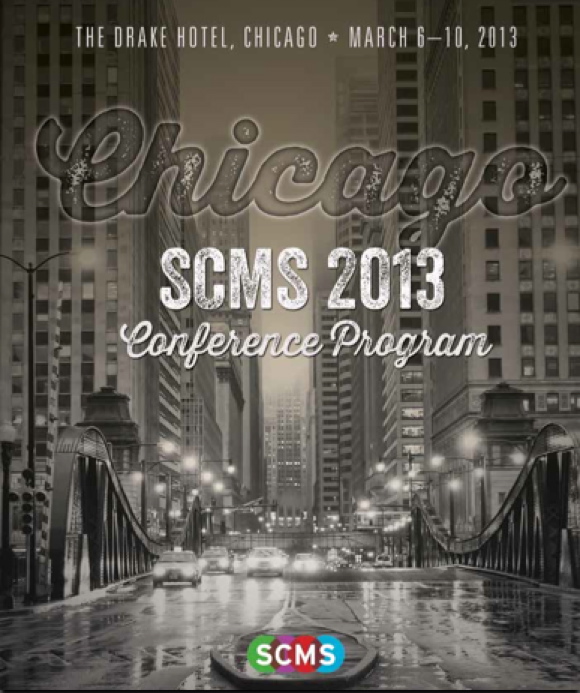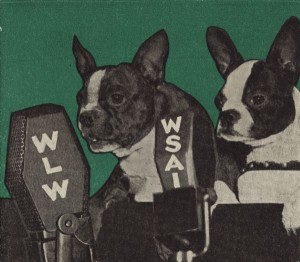Radio at SCMS 2013
 Next week, Chicago will host a bumper crop of outstanding qualitative scholarship on radio. No fewer than 12 panels at the Society for Cinema and Media Studies annual conference will feature at least one paper centered on radio, up from nine in 2012. Additionally, Neil Verma will take home the “Best First Book” award for his outstanding book on radio drama, Theater of the Mind, and Johanna Zorn of the amazing Third Coast International Audio Festival will give a talk on Sunday morning to help launch the newly formed Radio Studies Scholarly Interest Group (regarding which I proudly declare my conflict of interest). Clearly, radio studies have found a firm and presumably secure place within the organization, making SCMS the place for humanities-based qualitative approaches to studying radio. Not bad given that, as far as anyone seems to remember, the very first radio panel at SCMS was only in 1986. I’ll leave aside the question of whether 27 years is a long or short time to reach this place, and just say that it’s nice to be here.
Next week, Chicago will host a bumper crop of outstanding qualitative scholarship on radio. No fewer than 12 panels at the Society for Cinema and Media Studies annual conference will feature at least one paper centered on radio, up from nine in 2012. Additionally, Neil Verma will take home the “Best First Book” award for his outstanding book on radio drama, Theater of the Mind, and Johanna Zorn of the amazing Third Coast International Audio Festival will give a talk on Sunday morning to help launch the newly formed Radio Studies Scholarly Interest Group (regarding which I proudly declare my conflict of interest). Clearly, radio studies have found a firm and presumably secure place within the organization, making SCMS the place for humanities-based qualitative approaches to studying radio. Not bad given that, as far as anyone seems to remember, the very first radio panel at SCMS was only in 1986. I’ll leave aside the question of whether 27 years is a long or short time to reach this place, and just say that it’s nice to be here.
Why is this important to non-radio scholars? For one, we’re on ur panels, expandin ur themez. While there are still a fair number of stand-alone radio panels this year, SCMS in Chicago will be characterized by a greater number of panels on which radio is included alongside other media, such as Veronica Zavala’s paper on Spanish-language radio on a panel about Latina/o identity, or Chie Niita’s radio-themed paper on a panel about Japanese cinema. It will be as healthy for film scholars to hear a radio perspective on their panel topic as it will be for radio scholars to be more fully included in some of the broader transmedia scholarly conversations going on at the conference.
Second, it is becoming increasingly clear that what non-radio scholars think of as radio is probably wrong. Maybe radio studies is getting a little imperialistic, but one can now reasonably claim to be studying radio not just when the attention is on terrestrial radio, but also satellite radio, Spotify, PRX, Third Coast, Soundcloud, large swaths of YouTube, and much, much more. As with other media scholars, the object of study is constantly shifting and represents, even more than it ever did, structures and practices extending far beyond a specific technology or technologies. The distinction between a radio scholar and a new media scholar is, at this point, mostly just a sloppy shorthand. Experiments like this one demonstrate the power of refusing such distinctions.
 This leads to the third reason this is important: the possibility that the days of broadcast history as a structuring other of “new media” are finally coming to an end. At the risk of further reifying the highly misleading “radio = history” trope that I just spent two paragraphs refuting, it is worth pointing out the ways in which a specialization in media history can be a tough gig these days. The number of jobs for broadcast historians this year, for example, is dwarfed by orders of magnitude by job calls for new media or digital technology scholars. This isn’t merely departments wanting to keep up with the latest trends but in some ways is constitutive of divisions within the field itself. As a friend pointed out, there is a risk of relying on the otherness of old media to help define the newness of new media, a kind of exaggeration of how different the present is from the past. In that sense, jobs, publications, funding, and more can come to depend on artificial temporal distinctions that map all too neatly (and problematically) onto technological forms.
This leads to the third reason this is important: the possibility that the days of broadcast history as a structuring other of “new media” are finally coming to an end. At the risk of further reifying the highly misleading “radio = history” trope that I just spent two paragraphs refuting, it is worth pointing out the ways in which a specialization in media history can be a tough gig these days. The number of jobs for broadcast historians this year, for example, is dwarfed by orders of magnitude by job calls for new media or digital technology scholars. This isn’t merely departments wanting to keep up with the latest trends but in some ways is constitutive of divisions within the field itself. As a friend pointed out, there is a risk of relying on the otherness of old media to help define the newness of new media, a kind of exaggeration of how different the present is from the past. In that sense, jobs, publications, funding, and more can come to depend on artificial temporal distinctions that map all too neatly (and problematically) onto technological forms.
As radio studies expands and becomes normalized within media studies, this dynamic increasingly loses force—and as that happens, the field as a whole gets stronger. It is with some optimism, then, that we can say the solidity of radio studies at SCMS this year portends a healthy decline in scholarly digital exceptionalism in the coming years. In the spirit of promoting that outcome, I’ll close with a public service announcement—a quick recap of where you are sure to catch radio scholarship and conversations next week:
Wed., 3/6, 10:00 (A12): Veronica Zavala on Spanish-language radio in the U.S.
Wed., 3/6, 4:00 (D12): Sindhu Zagoren on the struggle for airspace in early radio
Thu., 3/7, 11:00 (F22): Panel on Norman Corwin and transmedia authorship (papers by Jacob Smith, Mary Ann Watson, Shawn VanCour, and Alexander Russo; Neil Verma chairing)
Fri., 3/8, 9:00 (J21): Panel on gender and broadcasting (papers by Jennifer Wang, Kathryn Fuller‐Seeley, Catherine Martin, and Joanne Morreale)
Fri., 3/8, 12:15 (K14): Panel on the radio archive (papers by Katherine McLeod, Melissa Dinsman, and Ian Whittington; Debra Rae Cohen responding)
Fri., 3/8, 2:15 (L11): Chie Niita on Japanese cinema and radio
Fri., 3/8, 4:15: Neil Verma’s “Best First Book“ award
Sat., 3/9, 9:00 (M23): Panel on radio industries with Eleanor Patterson, Brian Fauteux, Jason Loviglio, Jeremy Morris, Elena Razlogova, and Alexander Russo
Sat., 3/9, 11:00 (N4): Panel on radio in transition (papers by Kyle Barnett, Cynthia Meyers, and Andrew Bottomley; Kathy Fuller‐Seeley responding)
Sat., 3/9, 1:00 (O14): Bill Kirkpatrick on disability and radio
Sat., 3/9, 3:00 (P18): Panel on economies in media industries (papers by Josh Shepperd, Colin Burnett, James Lastra, and Douglas Gomery; Brett Gary chairing)
Sat., 3/9, 5:00 (Q9): Isabel Huacuja Alonso on All-India Radio
Sat., 3/9, 5:00 (Q11): Kyoko Omori on radio satire in occupied Japan
Sun. 3/10, 9:00: Radio Studies SIG meeting (featuring Johanna Zorn of The Third Coast International Audio Festival)



[…] a Radio Studies Scholarly Interest group and will have a launch event at the conference. In a post on the Antenna blog, Bill Kirkpatrick gives a great overview of the embarrassment of riches for radio geeks like me. He […]
[…] among others, for bringing this about. Readers interested in the radio SIG should hop over to Antenna to read Kirkpatrick’s terrific piece on the emergence of radio studies at SCMS this year (and be […]